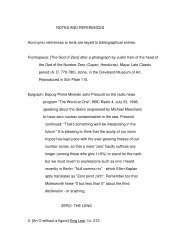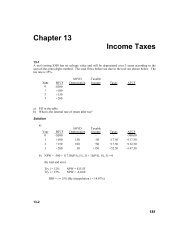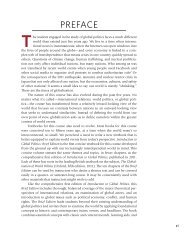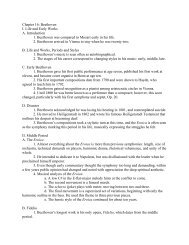CHAPTER 3 Consumer Preferences and Choice
CHAPTER 3 Consumer Preferences and Choice
CHAPTER 3 Consumer Preferences and Choice
You also want an ePaper? Increase the reach of your titles
YUMPU automatically turns print PDFs into web optimized ePapers that Google loves.
03-Salvatore-Chap03.qxd 08-08-2008 12:41 PM Page 61<br />
✓ Concept Check<br />
What is the distinction<br />
between cardinal <strong>and</strong><br />
ordinal utility?<br />
EXAMPLE 3–1<br />
Does Money Buy Happiness?<br />
✓ Concept Check<br />
How much money do<br />
you need to be happy?<br />
<strong>CHAPTER</strong> 3 <strong>Consumer</strong> <strong>Preferences</strong> <strong>and</strong> <strong>Choice</strong> 61<br />
The distinction between cardinal <strong>and</strong> ordinal utility is important because a theory<br />
of consumer behavior can be developed on the weaker assumption of ordinal utility<br />
without the need for a cardinal measure. And a theory that reaches the same conclusion<br />
as another on weaker assumptions is a superior theory. 4 Utility theory provides a convenient<br />
introduction to the analysis of consumer tastes <strong>and</strong> to the more rigorous indifference<br />
curve approach. It is also useful for the analysis of consumer choices in the face<br />
of uncertainty, which is presented in Chapter 6. Example 3–1 examines the relationship<br />
between money income <strong>and</strong> happiness.<br />
Does money buy happiness? Philosophers have long pondered this question.<br />
Economists have now gotten involved in trying to answer this age-old question. They<br />
calculated the “mean happiness rating” (based on a score of “very happy” = 4,<br />
“pretty happy” = 2, <strong>and</strong> “not too happy” = 0) for individuals at different levels of personal<br />
income at a given point in time <strong>and</strong> for different nations over time. What they<br />
found was that up to an income per capita of about $20,000, higher incomes in the<br />
United States were positively correlated with happiness responses, but that after that,<br />
higher incomes had little, if any, effect on observed happiness. Furthermore, average<br />
individual happiness in the United States remained remarkably flat since the 1950s in<br />
the face of a considerable increase in average income. Similar results were found for<br />
other advanced nations, such as the United Kingdom, France, Germany, <strong>and</strong> Japan.<br />
These results seem to go counter to the basic economic assumption that higher personal<br />
income leads to higher utility.<br />
Two explanations are given for these remarkable <strong>and</strong> puzzling results: (1) that<br />
happiness is based on relative rather than absolute income <strong>and</strong> (2) that happiness<br />
quickly adapts to changes in the level of income. Specifically, higher incomes make<br />
individuals happier for a while, but their effect fades very quickly as individuals adjust<br />
to the higher income <strong>and</strong> soon take it for granted. For example, a generation ago, central<br />
heating was regarded as a luxury, while today it is viewed as essential.<br />
Furthermore, as individuals become richer, they become happier, but when society as<br />
a whole grows richer, nobody seems happier. In other words, people are often more<br />
concerned about their income relative to others’ than about their absolute income.<br />
Pleasure at your own pay rise can vanish when you learn that a colleague has been<br />
given a similar pay increase.<br />
The implication of all of this is that people’s effort to work more in order to earn<br />
<strong>and</strong> spend more in advanced (rich) societies does not make people any happier because<br />
others do the same. (In poor countries, higher incomes do make people happier).<br />
Lower taxes in the United States encourage people to work more <strong>and</strong> the nation to<br />
grow faster than in Europe, but this does not necessarily make Americans happier than<br />
4 This is like producing a given output with fewer or cheaper inputs, or achieving the same medical result<br />
(such as control of high blood pressure) with less or weaker medication.
















